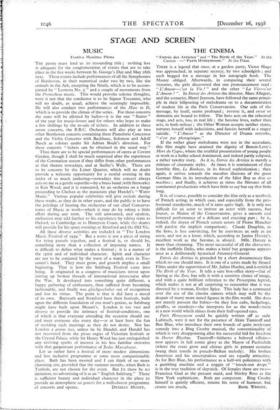THE CINEMA
THERE is a legend that once, at a garden party, Victor Hugo was approached, in separate secrecy, by two schoolgirls ; and each begged for a message in her autograph book. The Master obliged. Afterwards, in comparing their several victories, the girls discovered that one pronouncement read : " L'Amour—c'est la Vie ! "- and the other "La Vie—c'est L'Amour ! ". In Entrée des Artistes the director, Marc Allegret, and the scenarist, Henri Jeanson, have followed the same princi- ple in their billposting of melodrama on to a documentation of student life at the Paris Conservatoire. One side of the message, by itself, seems profound ; reverse it,, and ennui or dementia are bound to follow. The hero acts on the rehearsal stage, and acts, too, in real life ; the heroine lives, rather than acts, in both milieux ; the Other Woman accepts neither states, tortures herself with indecisions, and fancies herself as a stagey suicide. " L'Amour " as the Director of Drama remarks, " n'est pas photogenique."
If the rather gluey melodrama were not in the ascendant, this film might have attained the dignity of Benoit-Levy's Mort du Cygne, where the truthful presentation of young people at work in a ballet school dominated, and indeed Partly eclipsed, a rather tawdry story. As it is, Entrée des Artistes is merely a mixture of cinematic styles. At times it is reminiscent of that horrible film, Le Bonheur, in its forced sophistication ; then again, it strives towards the macabre illusions of the great German films in its introduction of the Idiot Boy as deus ex machina ; and finally, it achieves at times the Nirvana of all continental productions which have little to saY but say that little long.
It is, of course, possible to consider the film only as a textbook of French acting, in which case, and especially from the pro- fessional standpoint, much of it rates quite high. It is only too difficult for an actor to imitate an actor with success, but Jouvet, as Maitre of the Conservatoire, gives a smooth and honeyed performance of a delicate and exacting part ; he is, indeed, the doyen of Frenck screen actors (if Pierre Blancher will pardon the implicit comparison). Claude Dauphin, as the hero, is less convincing, for he convinces us only as an actor, and not as a lover, which, according to Janine Darcey's excellent work as the heroine, is absurd. Mlle. Darcey is more than charming. The most successful of all the characters is the ineffable Dalio, who makes a brief but gorgeous appear- ance as a deliberately hysterical Attorney-General.
Entrée des Artistes is preceded by a short documentary film which no one should miss. It is one of a series made by Strand Films under the supervision of Mr. Julian Huxley, and is entitled The Birth of the Year. It tells a sure box-office story—that of Spring at the Zoo, but tells it with a- sensitive choice of image, and with a quite brilliant reference to the Proserpina legend, which makes it not at all surprising to remember that it was directed by a woman, Evelyn Spice. This lady has a command over the use of the cinema camera which may well be the despair of many more noted figures in the film world. She does not merely present the babies—be they lion cubs, hedgehogs, giraffes, or monkeys—she interprets for us the wonderment at a new world which shines from their half-opened eyes.
Paris Honeymoon could be quickly written off as stale Lubitsch, were it not for the presence of Akim •Tamiroff and Ben Blue, who introduce their own brands of quite irrelevant comedy into a Bing Crosby musical, the conventionality of which is very disappointing after his successful bid for freedom in Doctor Rhythm. Tamiroff—hitherto a beloved villain— now appears in full comic glory as the Mayor of Pushtalnik (where the roses grow and chorus girls in peasant costume twang their tonsils in pseudo-Balkan melody). His broken American and his unscrupulous soul are equally attractive. As for Ben Blue, his performance as a half-wit policeman with a gambling machine and a noggin of "knock-out drops" is in the true tradition of slapstick. Of females there are two- Francisca Gaal as the peasant maid, and Shirley Ross as the New York sophisticate. Both are competent. Bing Crosby himself is quietly efficient, retains his sense of humour, but














































 Previous page
Previous page